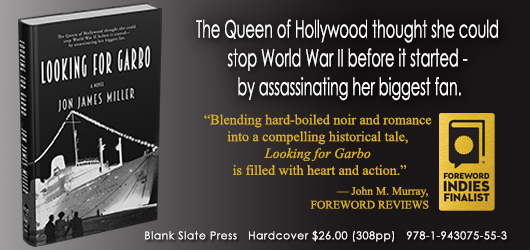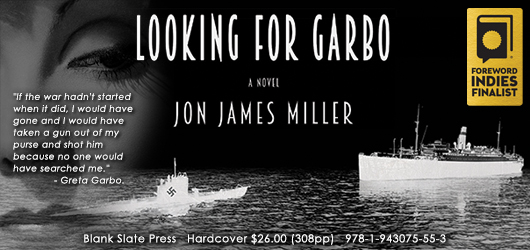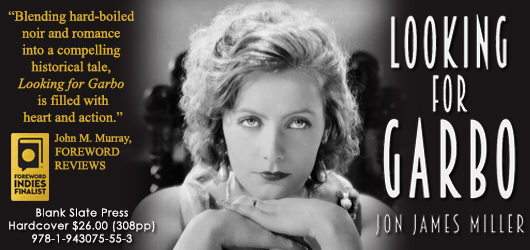Reviewer Engages with Jon James Miller, Author of Looking for Garbo
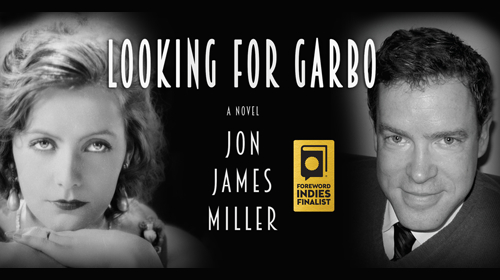
From agriculture to music, most modern-day practices have roots in the earliest days of human history, but few of these enduring elements have enjoyed a continued claim on the public’s imagination more than the history of war and conflict. We appear endlessly fascinated by the spreading and toppling of empires, the cunning rise and bloody fall of monarchs and dictators, and the weaponry and technology used to bring it about. Of all the conflicts in all the world, however, there is one that continues to intrigue, inform, and mystify, still looming large in our collective consciousness as it compels study from scholars and sparks inspiration in artists around the globe.
The impact and influence of World War II is impossible to overstate. New technologies were tested on the battlefields, forever changing the landscape of warfare, while collapsing class structures, revolutions in industry, and the explosion of simmering social and political tensions rattled countries to their cores. Beneath the polished veneer of pin curls and fedoras, spies, assassins, and secret organizations thrived, this tantalizing contrast playing out on page and screen as the gritty noir era seized entertainment.
Following in this grand tradition of wartime drama and intrigue comes Jon James Miller’s blend of fact and fiction, Looking for Garbo, an enthralling novel centered on the illustrious Greta Garbo and her real-life connection to Adolf Hitler. In his review for the March/April issue of Foreword Reviews, John M. Murray called the novel a “compelling adventure rife with violence, sex, and genre tropes,” inspiring us to reach out to Blank Slate Press about connecting reviewer and author for an interview.
Over to you, John.
Both you and James Main share a love of making films, he as a documentarian and you as an award-winning script writer. How much of you and your life did you draw upon when bringing James to life?
Like the character of James, my mom was a voracious reader and huge classic movie fan. She turned me on to all the stars of the 1930s and 40s, including Greta Garbo. Years later, after my mom passed of colon cancer and I attended film school, I thought it would be fun to cast Garbo in a film noir thriller. That’s when I read about the very real plan Garbo had cooked up with British Secret Intelligence, and called “The Big One,” to assassinate her biggest fan, Adolf Hitler.
It would be years later, after I graduated and moved to Los Angeles to work in Hollywood, when an interesting coincidence happened. I was working on a cable documentary and came across Seth Moseley, an old tabloid reporter. I interviewed Seth for a segment on the Lindbergh Baby Kidnapping, which he had scooped for the Associated Press. After we became friends and pen pals, he told me about how he had discovered Garbo in the men’s room aboard an ocean liner in the Port of New York. She was hiding from a gaggle of reporters who had learned she was onboard traveling under an alias. Seth’s real-life encounter with the movie star inspired me to finally write the novel.
What differences, if any, are there between script writing and novel writing? Did you find any surprising challenges while writing this novel and was anything easier?
I find that screenwriting goes a lot faster for me. I’m more used to the script structure than novel writing because I’ve been doing it a lot longer. However, that’s not to say it’s easier. Scripts are all about “white on the page” and economy of word. Distilling what you might spend an entire chapter on in a book into one sequence of scenes, or sometimes one scene, is incredibly hard. On the other hand, novel writing takes years with anywhere from 90,000 to 120,000 words in length. It can be incredibly difficult keeping all those details in your head, let alone editing, revising, and reworking a 300-plus page document.
So, in the end I guess both novel writing and screenwriting have their challenges. I would say the one huge upside to novel writing, and the reason I pursued it as a career, is that once you’re done with a novel you have a complete artistic vision. Whereas, when you’ve completed a screenplay someone has to come along and produce it into a film to be fully realized. There aren’t many people I’ve found who are chomping at the bit to read a script like they are a well-written novel.
The inspiration for the novel comes from the alleged spy work Greta Garbo participated in, along with her personal story of receiving a letter from Adolf Hitler and her outspoken desire to assassinate him personally. How did you first decide to use that as story inspiration and how did you balance reality and fiction?
Greta Garbo’s career would come to an abrupt end in 1941 with the ill-conceived comedy Two-Faced Woman, her last film. But I’ve always believed that wasn’t the real reason she turned her back on Hollywood. The war had already changed the world and cinema forever, ushering in the dark and menacing noir films of the 1940s, leaving Garbo’s romantic heroines in the cold.
I thought it would be fun casting Garbo, the heroine from Mata Hari and Queen Christina, in her own noir film based on her real-life, top secret mission to kill Hitler. I wanted to explore what it would actually be like if Garbo had embarked on her secret mission, then simply ran out of time en route. What would have happened to her trapped on the open sea, surrounded by Nazis? I thought that would make a great noir thriller story if I could pull it off. If I could pull off the reality of that moment in time, starring the enigmatic movie star in her own would-be suicide mission to save the world. Of course, Garbo never got to make a noir movie but she is so mysterious in her own right that I think she would have been fantastic in one.
As a renowned script writer, are there any plans to adapt Looking for Garbo to film? If it were to be made into a film, would you allow someone else to adapt? Any standout casting choices for James and Seth?
Ironically, Looking for Garbo started out life as a script. I wrote it over ten years ago now and it won a lot of screenwriting awards. I guess that’s ultimately what gave me the confidence in the story to adapt it as my debut novel. I tried to create in the novel the same cinematic universe in which the script exists, so by that standard I think it could easily be adapted for film. Knowing the movie industry like I do, I wouldn’t have any problem with someone else adapting the novel now. I mean, I’d love the opportunity to adapt it myself because I have that skill, but I certainly wouldn’t get in the way of someone else doing it, either.
As for casting Seth and James, I could see a Pacino, DeNiro, or Eastwood doing a great job with old Seth. Young Seth is a little tougher for me but if I had my choice, I know Ryan Gosling or James McAvoy would do a wonderful job. James is probably the easiest to cast. Maybe Michael Cera or even Jonah Hill could bring their particular brand of humor and humility to the role.
Seth provides James with a unique opportunity, the untold story explaining Garbo’s decision to leave Hollywood. At first, Seth seems like an unreliable narrator or someone seeking last-minute fame. As the real story is shrouded in mystery, what challenges did balancing crafting a compelling story and retaining accuracy bring up and how did you address them?
I did a ton of research before I even started the novel. I am a huge fan of both World War II and Golden Age Hollywood and spent a lot of time getting the timeline and facts right. Since the work is based on a real-life story, the timeline was easy because Garbo said herself, “If the war didn’t start when it did, I would have gone and I would have taken a gun out of my purse and shot him [Hitler].” By having Garbo leave on the very eve of war in Europe, September 2nd, I found I could base everything else on that central story conceit.
The escalation of the thriller relies on the fact she and Seth are on an ocean liner on the open sea—not a great place to be when you consider there are literally hundreds of U-boats waiting for you, not to mention Nazi aircraft when the war suddenly starts. Since we know from the beginning that both Garbo and Seth will survive, the hardest part was creating that suspense and coming up with the reality-based device for how they would ever safely get off the SS Athenia (the actual civilian vessel sunk by the Nazis that sparked the war in Europe). Once I had figured that out, all the other elements and characters pretty much snapped into place.
Looking for Garbo blends genres for a captivating adventure/romance/noir story. Do you have any other historical legends or rumors you’d like to explore in either film or novel form?
My next novel is another historical fiction/romance/gothic ghost story based on the true origin story surrounding Pepper’s Ghost, the Victorian stage illusion used to great effect in Disney’s Haunted Mansion, as well as the basis for what they’re using to bring back dead stars like Michael Jackson, Tupac Shakur, and Whitney Houston on holographic stages around the world today. I particularly love the macabre and anything to do with Victorian England, so I’m enjoying all the research and crawling into the skin of Professor John Henry Pepper and Henry Dircks, the two Victorian gentlemen of science who created the stage effect. It’s also set around Christmas, my all-time favorite holiday and traditionally the time of year when people would tell each other ghost stories. If all goes well, I should have the manuscript completed later this year. Who knows, if Looking for Garbo gets optioned or sold to Hollywood someday, maybe they’ll give me a crack at adapting Professor Pepper’s Ghost, the movie!
Looking for Garbo
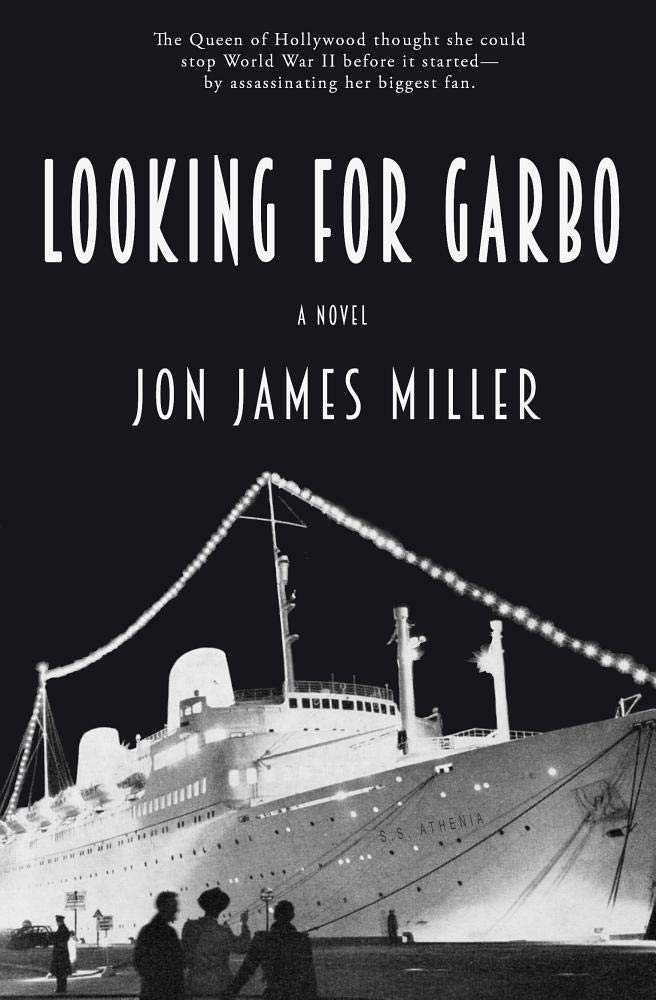
Jon James Miller
Blank Slate Press
Hardcover $26.00 (308pp)
978-1-943075-55-3
In Jon James Miller’s heartwarming noir Looking for Garbo, James is dying for a unique story to build a documentary around. Seth, who’s dying of emphysema, lures James in with a tale centered around legendary actress Greta Garbo and her connection to Adolf Hitler. Seth’s story seems too good to be true, but after a freak accident leaves both men in the same hospital ward, James manages to pull the truth out of Seth. What follows is a strangely compelling adventure rife with violence, sex, and genre tropes.
The foreword indicates that Miller drew upon historical facts and a personal connection for his text; he spoke with the real-life Seth. Expanding on the premise of Garbo’s connection to the dictator with a lively cast of characters, the story alternates between Seth’s romantic narration of his adventures aboard the SS Athenia and James’s present-day drive to complete his movie and find an emotional resolution.
Seth and James shine in their roles. Seth begins as a charming scoundrel, but his realness and flaws are revealed. James is fleshed out more slowly––most of all when he begins a relationship with his nurse. Over the course of the story, James and Seth––initially tied together by their adoration of Greta Garbo––connect in surprising ways, discovering similarities from mother issues to their longing for connection; these lead to a shocking, satisfying ending.
Seth’s tale could almost be considered its own novel. As he recounts his journey with Garbo, the story moves quickly––with more speed, even, than his present day narrative with James. Its elements, including multiple double agents on board the ship and repeated blows to Seth’s head, are larger than life. Blending hard-boiled noir and romance into a compelling historical tale, Looking for Garbo is filled with heart and action.
JOHN M. MURRAY (February 27, 2019)
John M. Murray

